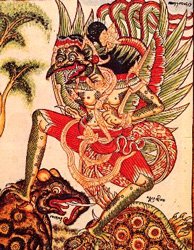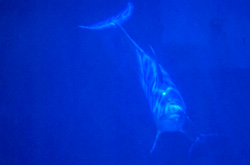Cryptozoology and Unknown Creatures
Ancient cultures are at times most memorable by mythological stories of legendary monsters and ratifying concepts of half-man, half-beast creatures. Some creatures are considered by many to primarily serve the purpose of story-telling, indicating society's willingness to sensationalize events to convey a specific message, perhaps one riddled with ulterior motives. There are countless reasons why lore, legend, and myth can become imprinted in society, but the message must be of great importance if its legend is to survive the ages.
-
 Evidence
In search of hard evidence to prove the existence of big foot.
Evidence
In search of hard evidence to prove the existence of big foot.
-
 Sea Encounters
Face to face with strange sea serpent creatures in North America.
Sea Encounters
Face to face with strange sea serpent creatures in North America.
-
 Colossal Monsters
Legends of fishermen capturing abnormally large sea animals.
Colossal Monsters
Legends of fishermen capturing abnormally large sea animals.
-
 Dragons
Fossil record may indicate where dragons originated.
Dragons
Fossil record may indicate where dragons originated.
-
 Bigfoot & Wildman
Theory of bigfoot as a flesh and blood relative of our ancestors.
Bigfoot & Wildman
Theory of bigfoot as a flesh and blood relative of our ancestors.
-
 Flying Creatures
Threats from flying animals in ancient life during the cave era.
Flying Creatures
Threats from flying animals in ancient life during the cave era.
-
 Sengalang Burong
Large and mysterious Javanese forest owl believed to be the bird god.
Sengalang Burong
Large and mysterious Javanese forest owl believed to be the bird god.
-
 Misignwa
Shawnee Indian lore possibly describes the existence of Mothman.
Misignwa
Shawnee Indian lore possibly describes the existence of Mothman.
-
 Mothman Sighting
Mysterious shadow figure believed by locals to warn of danger.
Mothman Sighting
Mysterious shadow figure believed by locals to warn of danger.
-
 Thunderbird Home
Indian legend from oral tradition describing the home of the thunderbird.
Thunderbird Home
Indian legend from oral tradition describing the home of the thunderbird.
-
 Great Spirit
Examining how oral tradition warns of danger with legend.
Great Spirit
Examining how oral tradition warns of danger with legend.
-
 Hypothetical
Concepts inspiring legends of strange beasts and creatures.
Hypothetical
Concepts inspiring legends of strange beasts and creatures.
-
 Lake Champlain
Legend of a horned-serpent water creature hides in the lake.
Lake Champlain
Legend of a horned-serpent water creature hides in the lake.
-
 Loch Ness
Nessie legend suggests lake monsters have survived for millions of years.
Loch Ness
Nessie legend suggests lake monsters have survived for millions of years.
-
 Lake Serpents
Eyewitness accounts of sea serpent creatures found in North America.
Lake Serpents
Eyewitness accounts of sea serpent creatures found in North America.
-
 Technology
Modern technologies in the search for discovering legendary cryptids.
Technology
Modern technologies in the search for discovering legendary cryptids.
-
 Ocean Cryptids
Colossal squid and giant creatures lurking the depths of Earth's oceans.
Ocean Cryptids
Colossal squid and giant creatures lurking the depths of Earth's oceans.
-
 Giant Otter
Theory of giant otters migrating to northern parts of Europe.
Giant Otter
Theory of giant otters migrating to northern parts of Europe.
-
 Passamaquoddies
Legend of turning into a giant bird to find the source of thunder.
Passamaquoddies
Legend of turning into a giant bird to find the source of thunder.
-
 Proximity
World population placing people in proximity to discovering cryptids.
Proximity
World population placing people in proximity to discovering cryptids.
-
 Reptile Humans
Encounters with hybrid human-fish creatures and anomalies of the sea.
Reptile Humans
Encounters with hybrid human-fish creatures and anomalies of the sea.
-
 Abyssal Monsters
Unknown legendary creatures from the deepest reaches of the ocean.
Abyssal Monsters
Unknown legendary creatures from the deepest reaches of the ocean.
-
 Swamp Monster
Encounters with a lizard humanoid creature in the swamps of South Carolina.
Swamp Monster
Encounters with a lizard humanoid creature in the swamps of South Carolina.
-
 Water Devils
Legendary hybrid creatures living in lakes around the world.
Water Devils
Legendary hybrid creatures living in lakes around the world.
-
 Water Dwelling
Historical accounts of water dwelling cryptids similar to Plesiosaurs.
Water Dwelling
Historical accounts of water dwelling cryptids similar to Plesiosaurs.

Dolphin in Murky Water
A peculiarity here is the fact that 99.9% of imagined concepts must be seeded, according to psychology, in order to become manifested in story-form. This highly suggests any mythological story, any imagined concept, or any tall tale fabled frenzy, must have originated from some sort of root inspiration. The trouble is really in determining exactly which parts of ancient stories aren't fabricated truths, perhaps intentionally stretched for theatrical entertainment.
Examining modern movies and storytelling might give us a little attestation as to why certain structural elements are used to relay plots. A boom in computer technology generously helped facilitate public demand for more realistic movies and provided significant improvements to live entertainment venues. If the general public strives now for a strong sense of realism in fictional storytelling, maybe it's not too far off to expect it many hundreds of years ago, as stage entertainment relied heavily on captivating audiences to similar extent. Now the legends continue to pique curiosity around the world.
Even though lore is subjected to a thousand year old telephone game with stretching fish, core beliefs are often based on factual events in some way, shape, or form.
†
